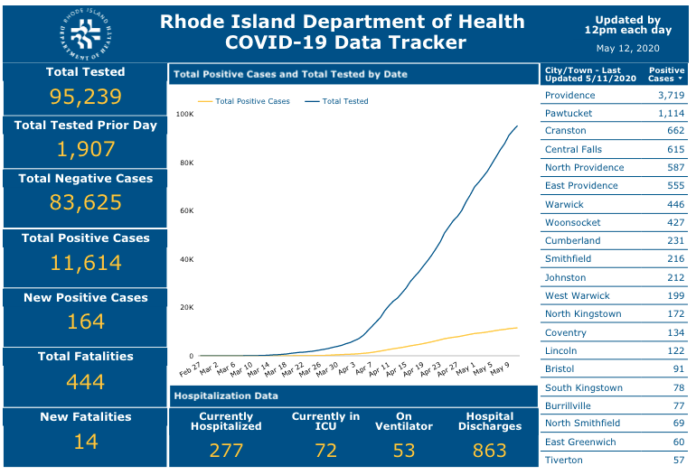PROVIDENCE – With the state of Rhode Island facing an $800 million budget deficit as a result of the COVID-19 pandemic, Gov. Gina M. Raimondo said during her daily press briefing Tuesday it is “hard to see” how the state can get out of the situation without doing furloughs of state employees.
Raimondo said the state has begun work “in earnest” in order to try and close the major gap for the next fiscal year. The governor said that while she wants to avoid furloughs, she was unsure if that is possible, noting that the upcoming budget is, “going to be brutal.”
“It’s something we have to look at,” Raimondo said. “I have to find money. I don’t know where we’re going to find $800 million. Everyone is going to be unhappy. Everything is on the table. You can’t fill an $800 million hole.”
Raimondo said she’s been trying to push state employees to help with contact tracing and data analysis in lieu of increasing the already-high unemployment rate in Rhode Island – more than 154,000 were out of work as of last Thursday.
“We’re taking state employees who are not otherwise fully engaged and put them in aid of the crisis to help with our work,” Raimondo said, also noting that “traditional cuts” can’t be done and things have to be done differently.
The governor said she has been informed constantly by the federal government that there’s “very likely” to be another stimulus package to help states close significant budget gaps, and more guidance would be offered within two to three weeks. Closing budget gaps like this can’t be done with “one-time fixes,” Raimondo said, and there has to be “structural changes.”
“We’re just putting the plans in place,” Raimondo said. “But to answer your question about furloughs, I don’t see how we can get through [the budget process] without it.”
As far as the pandemic itself, Raimondo said the numbers for cases and hospitalizations remained stable. Positive cases of COVID-19 in the state increased by 164, to 11,614, and 1,907 tests were conducted Monday – amounting to a 9% positive rate. To date, Rhode Island conducted 95,239 tests.
“It’s a good data story,” Raimondo said. “It’s a continued plateau.”
The governor said the state is not seeing a decline, but the picture is “steady.” There are currently 277 people hospitalized with COVID-19 in the state, a one-patient increase day to day. Of those hospitalized, 72 are in intensive care units and 53 are on ventilators; each declining by one day to day. To date, the state has seen 863 discharges of COVID-19 patients.
Raimondo, however, is concerned about why the communities of color and Latino communities are disproportionately affected by the virus. Providence has the most confirmed COVID-19 cases with 3,719, while Pawtucket is second at 1,114.
Raimondo said the state is working to “beef up” access to health care for everyone in Rhode Island. Also, the state has testing sites in Woonsocket, Pawtucket, Central Falls, East Providence, Newport, and the Olneyville section and south side of Providence, Raimondo said.
“We’re going to continue to add more of these walk-through sites… in communities that are the poorest and toughest hit,” Raimondo said. “Every day, we try to do more.”
Fourteen more deaths were reported Tuesday by the R.I. Department of Health, bringing the state’s total to 444. The newly reported deaths ranged in age from a person in their 60s to an individual older than 100, Alexander-Scott said.
Raimondo also said she was pleased with how the first four days went after she lifted the stay-at-home order and allowed businesses to reopen with restrictions, with the majority of workers and customers in stores wearing masks and abiding by state guidelines.
On May 18, the state will allow restaurants by reservation only to have outdoor dining service. R.I. Health Director Nicole Alexander-Scott said restaurants are going to keep customers’ contact information for 30 days should that information be needed for contact tracing. If a person ate at a restaurant were to test positive for the virus, it does not automatically mean people will be asked to go into a 14-day quarantine. Only people who came in close contact with a person who tested positive would need to be quarantined, Alexander-Scott said.
Raimondo reiterated that the state needs to change how it lives as the virus is expected to be in the area for about a year or so unless a vaccine or treatment is developed. She urged residents to not fight against the new regulations and to “not get frustrated.”
“That’s not going to be easy,” she said. “But if we go back to the old way of doing things, we’re going to get into trouble. Too many people will get sick and we’ll see that incline again.”
How residents act as the economy reopens will show up in cases “two weeks from now,” Raimondo said, and if hospitalizations, cases and possibly deaths increase too much, the state would have to pull back on reopening. She pleads for residents to “try to live” within the new rules for the state to reopen slowly.
“If we push it too fast in the beginning, we’ll overwhelm the system and we’ll wind up right where we started,” Raimondo said.
Raimondo plans to offer details Thursday on when the state can move from Phase 1 reopening to Phase 2. The second phase, according to the state, would possibly allow more restaurants and businesses, like hair salons, to reopen; additional parks and beaches to reopen; increasing social gatherings to no more than 15 people (currently it’s no more than five people through May 22); and other options. Raimondo said she would outline what kind of a surge in cases would cause for Rhode Island to “go backwards.”
While acknowledging that residents may be nervous in stepping out in public again, Raimondo also urged people that they need to “muster up the courage” to get back out, including making appointments for nonessential medical procedures.
Regarding health care, Raimondo announced that the R.I. Executive Office of Health and Human Services has committed $8.2 million in additional wages to 10,300 health care workers, many of whom are making less than $20 an hour, at 164 facilities, to help ease financial burden for the workers. More than $6 million have already been distributed, Raimondo said, and the remaining funds will be given out later this week.
The federal Emergency Management Agency is going to be sending “a limited” amount of personal protective equipment to nursing homes starting next week, Raimondo said. She also said the federal government, every week, will send out a “specific supply” of PPEs for nursing home workers.
Raimondo also announced that Verizon, AT&T, T-Mobile and Sprint will extend its period of waiving fees for Wi-Fi hotspot use through June 30 – it was set to expire Thursday. About 1% to 2% of homes in Rhode Island do not have internet access and Raimondo urged families to call her office if they don’t have internet so that they can be set up so children can continue learning remotely.
This story has been updated to include details from the governor’s press conference.












